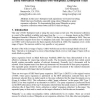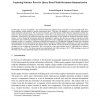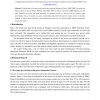RIAO
2007
15 years 4 months ago
2007
Nowadays we enter the Web 2.0 era where people’s participation is a key principle. In this context, collective annotations enable to share and discuss readers’ feedback with r...
148
click to vote
TREC
2008
15 years 4 months ago
2008
This paper describes our participation in the 2008 TREC Blog track. Our system consists of 3 components: data preprocessing, topic retrieval, and opinion finding. In the topic ret...
121
click to vote
RIAO
2007
2007
From Layout to Semantic: a Reranking Model for Mapping Web Documents to Mediated XML Representations
15 years 4 months ago
Many documents on the Web are formated in a weakly structured format. Because of their weak semantic and because of the heterogeneity of their formats, the information conveyed by...
TREC
2008
15 years 4 months ago
2008
: In this year's Enterprise track experiment, we focused on testing Blind Relevance Feedback, especially using online Wikipedia as query expansion collection. We demonstrated ...
139
click to vote
RIAO
2007
15 years 4 months ago
2007
In this paper, we have considered a real world information synthesis task, generation of a fixed length multi document summary which satisfies a specific information need. This...
102
click to vote
TREC
2008
15 years 4 months ago
2008
The vocabulary of the TREC Legal OCR collection is noisy and huge. Standard techniques for improving retrieval performance such as content-based query expansion are ineffective fo...
111
click to vote
RIAO
2007
15 years 4 months ago
2007
Search engines are among the most useful Internet applications. There exist several media types on the Web and, given the particularities of each of them, adapted search solutions...
147
click to vote
TREC
2008
15 years 4 months ago
2008
We participate in document search and expert search of Enterprise Track in TREC2008. The corpus and tasks are same as the year before. Different from TREC 2007, the topics come fro...
110
click to vote
RIAO
2007
15 years 4 months ago
2007
Focussed XML component retrieval is one of the most important challenges in the XML IR field. The aim of the focussed retrieval strategy is to find the most exhaustive and specifi...
108
click to vote
TREC
2008
15 years 4 months ago
2008
This paper presents an approach for the Opinion Finding task at TREC 2008 Blog Track. For the Ad-hoc Retrieval subtask, we adopt language model to retrieve relevant documents. For...



